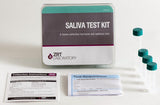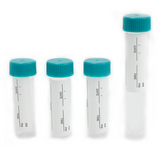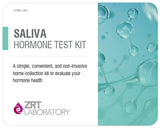Male Saliva Hormone Test Profile II – Advanced At-Home Hormone Testing for Men
The Male Saliva Hormone Test Profile II is a comprehensive, non-invasive test that measures six key male hormones from a simple saliva sample. Designed to assess hormonal balance, energy levels, mood, stress response, and reproductive health, it helps identify imbalances that affect performance and well-being.
What the Test Measures
- Testosterone (T): The main male hormone responsible for libido, muscle mass, energy, and vitality.
- Estradiol (E2): A form of estrogen that supports mood, bone health, and cardiovascular function.
- DHEAS: Produced by the adrenal glands; vital for hormone balance and stamina.
- Progesterone (Pg): Supports brain function, libido, and overall hormonal stability.
- Cortisol (Morning): Evaluates stress response and daily energy balance.
- Cortisol (Night): Assesses the body’s ability to rest, recover, and manage stress before sleep.
- How and When to Collect Your Saliva Samples: Saliva Testing Instructions
- Click to see >> Sample Saliva Test Result Report
Key Features and Benefits
- Full Hormone Profile: Tests six essential hormones for a complete hormonal overview.
- Accurate and Reliable: Lab-certified testing for clinically precise results.
- At-Home Collection: Simple saliva sampling without needles or clinic visits.
- Fast Results: Receive your report within 3–5 working days of sample arrival.
- Expert Review: Includes detailed comments and guidance from a PhD Hormone Specialist.
- Track Hormonal Changes: Ideal for monitoring testosterone decline, stress patterns, and overtraining effects.
- Personalized Recommendations: Actionable steps to restore hormone balance and boost energy, mood, and performance.
- All-Inclusive Kit: Price includes lab fees and analysis; only sample postage required.
- Long Validity: Use within 12 months of purchase for flexible testing.
- Suitable for All Ages: Can be used by both adult men and adolescents.
Why Saliva Testing?
- Non-invasive and painless – no blood draw needed.
- Measures active (“bioavailable”) hormones that directly affect the body.
- Easy home collection ensures accurate timing for cortisol and testosterone testing.
- Perfect for monitoring hormone replacement therapy (HRT), stress, or aging effects.
Who Should Take This Test
Men who experience:
- Fatigue or low motivation
- Reduced libido or erectile issues
- Mood swings or irritability
- Sleep disturbances or night sweats
- Muscle loss or increased belly fat
- Stress, burnout, or recovery problems
How It Works
- Order your kit online.
- Collect your saliva sample at home following the step-by-step guide.
- Send your sample to our accredited UK laboratory.
- Receive detailed results with expert interpretation in 3–5 days.
FAQ – Male Saliva Hormone Test Profile II
1. What hormones does this test measure?
Six key hormones: testosterone, estradiol, DHEAS, progesterone, and cortisol (morning and night).
2. Who should take this test?
Men with low energy, reduced libido, mood changes, poor sleep, or signs of hormonal imbalance.
3. Why use saliva instead of blood?
Saliva measures bioavailable hormones — the active forms influencing your body — using a simple, needle-free method.
4. How do I collect the sample?
Collect saliva at home using the provided tube and instructions. It’s fast, hygienic, and pain-free.
5. How long for results?
You’ll receive your full hormone report within 3–5 working days after the lab receives your sample.
6. What’s included in the results?
Graphical and numeric hormone values plus expert commentary and personalized guidance from a Hormone Specialist PhD.
7. Is it suitable for men on hormone therapy?
Yes. The test helps monitor and adjust hormone replacement therapy (HRT) for optimal results.
8. Are there any hidden costs?
No. The price includes all lab fees and analysis; you only cover postage when sending your sample.
9. Can I track changes over time?
Yes. Repeat testing helps monitor testosterone trends, cortisol rhythm, and long-term hormone balance.
10. Why choose Hormone Lab UK (ZRT LAB)?
Trusted UK laboratory, accurate saliva testing, fast turnaround, and expert hormone analysis — all from the comfort of your home.
How to Use











